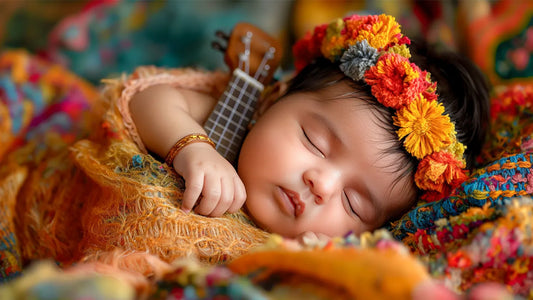Karnavedha sanskar: ear piercing for babies
Do you know that ear piercing holds much more cultural importance than people are aware of? Know the importance of Karmavedha sanskar, one of the 16 sanskaras in Hinduism that has been passed down for many generations.
Introduction is karnavedha sanskar
Karnavedha sanskar is an ancient ear-piercing ritual in Hinduism for babies performed between the 1st and 5th year of the child’s life. Karnavedha is one of the 16 major sanskaras mentioned in Hindu scriptures and it is considered an important ceremony as it symbolizes the child’s ability to hear and absorb knowledge.
Especially in India, this ceremony is celebrated with a special ear-piercing ceremony and all the family relatives and friends gather to give their blessings to the child. Do you know the customs, benefits, and safety considerations of this practice?
Don’t worry! In this blog, we will discover all the essential information about traditional ear piercing for babies.
What is the religious and cultural importance of the karnavedha?
This ritual is an important part of Indians, primarily of the Hindu religion. Historically performed for both males and females, the ear-piercing ritual in Hinduism is believed to open the ears for receiving sacred sounds. After the ceremony, babies are said to hear the spirits, which cleanses the mind and nurtures the spirit.
How to prepare your baby for Karnavedha Sanskar
It is ideal to wait until the baby turns 2-3 months old, as the baby's immune system gets stronger by that time and they get healthy enough to fight and protect themselves from infections. At the time of the ceremony, there are many things that you should do to protect your baby and complete the ceremony safely:
- Make sure that the ceremony is performed by an experienced priest or professional.
- Clean your baby’s earlobes with natural antiseptics and let the professional mark the exact spots where the piercing will be done.
- Make sure that the instruments and needles are clean and sterilized.
- Make sure to follow instructions given by the professional for the ceremony procedure and aftercare to heal your baby.
Clinical and cultural benefits of Karnavedha Sanskar for babies
- Beneficial in Ayurvedic medicine: Ear-piercing is considered highly beneficial in Ayurvedic medicine as it is said to stimulate acupressure points in the ear, which is thought to improve hearing and overall physical health and development.
- The ritual in itself strengthens the bond between the family and the child. It creates a sense of emotional connection, security, and support as everyone gathers to celebrate their little one and give the baby their utmost blessings.
- It helps the child to establish a connection with their cultural roots and get to know their cultural identity, which continues to stay with them later in life.
- The ear-piercing ritual in Hinduism is thought to stimulate and improve the nervous system as per the concepts of acupressure and acupuncture. It also protects the child from any hearing problems.
Aftercare tips for the baby
- Keep the pierced area clean: It is evident to keep the pierced area clean to avoid any infections or reactions and to keep the baby safe from potential allergies or other risks.
- Avoid getting the pierced area touched: It is important to keep the pierced area untouched to avoid pain and unnecessary infections that can happen from constant touch. Keep your baby from touching their ears, as that may hurt them.
- Keep the piercing dry: Avoid piercing to get wet for the initial time 2 weeks after the piercing. Be careful while bathing and avoid getting the piercing in contact with direct water.
- Monitor for allergic reactions: Keep an eye on allergic reactions happening and if you notice any slight hint of discomfort or visible reaction, immediately contact your doctor and take proper medical care.
- Allow the piercing to heal before changing the earrings: Do not immediately change the earrings after piercing for the first 5-6 weeks after piercing unless recommended by the professional, as it can cause swelling and pain to the child and a possible risk of infections.
If you notice discomfort or other reactions, immediately contact your healthcare provider and check for relevant treatments.
Conclusion
Karnavedha sanskar is an important part of Hindu culture and a joyful occasion for both the child and their family. The ear-piercing signifies that they can hear the sacred sounds, which nurture their spirit and cleanse their mind. This ceremony is an ideal time to celebrate the growth of your baby and make beautiful memories and bonds that last forever. And lastly, take proper care of your baby before, during and after the eir-piercing ceremony; take proper care and precautions as suggested by the professional; and try home remedies for the piercing to heal faster.
Shop for the Best Baby Care Products
FAQs
Q1. What is karnavedha sanskar?
Ans: Karnavedha sanskar is an ancient ear-piercing ritual in Hinduism for babies. It is one of the 16 sanskaras mentioned in the ancient Vedas, and it signifies that they can hear the sacred sounds, which nurture their spirit and cleanse their mind.
Q2. When is karnavedha sanskar typically performed?
Ans: It is typically performed between 1st and 5th years of a child’s age but you can do it later too.
Q3. What are the benefits of ear piercing for babies?
Ans: It is said to improve hearing, prevent ear infections and strengthen the cultural ties of the child.
Q4. What are the aftercare requirements for the piercing?
Ans: Keep the pierced area dry, avoid touching the piercing, don't change earrings too soon and follow the instructions as told by the professional.
Q5. What are the aftercare requirements for the piercing?
Ans: Piercing is safe for children over 2-3 months of age but you should perform it under hygienic conditions, take proper precautions and safety tips and consult your doctor before any activity to ensure your child’s safety.




